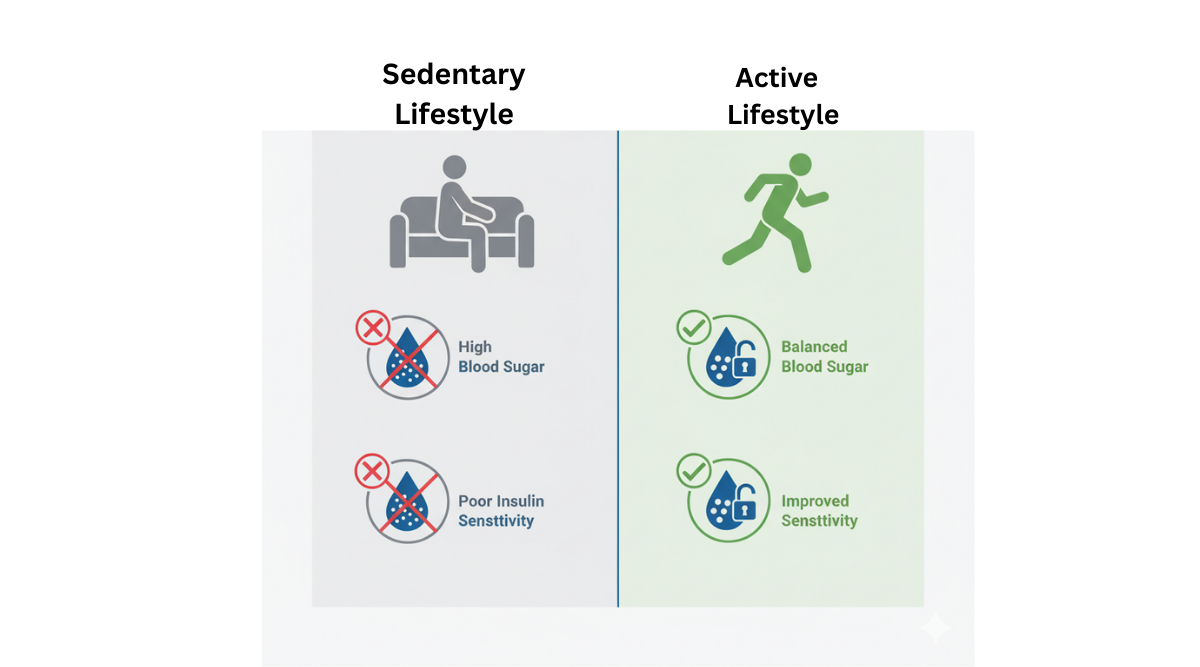Many people deal with insulin resistance without knowing it. This health problem can cause bigger issues later if you don't catch it early. Learning about insulin resistance helps you make better choices for your health.
Insulin resistance affects how your body uses blood sugar. It can change your energy levels and increase your risk of getting sick. This guide will help you understand what causes it, how it affects you, and what you can do about it.
What is Insulin Resistance?
Defining Insulin Resistance
Insulin resistance happens when your body's cells stop responding well to insulin. Insulin is a hormone your pancreas makes. It helps move sugar from your blood into your cells for energy.
When cells resist insulin, your body needs more insulin to do the same job. This can make your blood sugar go up over time. If this continues, you might get type 2 diabetes.
How Insulin Resistance Develops
This condition usually starts slowly. At first, your pancreas makes extra insulin to help. But it can't keep doing this forever.
High blood sugar starts to damage your cells. This makes the problem worse. Several things can cause insulin resistance. These include your genes, not moving enough, and eating too much sugar and bad fats.
The Role of Insulin in Blood Sugar Control
Insulin's main job is to control blood sugar. It helps muscles, fat, and liver cells take in glucose. This removes sugar from your blood.
When insulin works right, your cells get the energy they need. When it doesn't work well, cells can't process glucose properly. This causes high blood sugar, weight gain, and other health problems.
Causes of Insulin Resistance
Genetic Factors Influencing Insulin Resistance
Your genes play a big part in insulin resistance risk. Some people are more likely to get it because of their family history. Even people who eat well and exercise might still develop it.
Knowing your family health history helps. You can take steps early to prevent problems.
Impact of Diet and Nutrition
What you eat greatly affects insulin resistance. Processed foods, bad fats, and lots of sugar make it worse. These foods cause quick spikes in blood sugar.
Your pancreas has to work harder when you eat these foods. Over time, your cells become less sensitive to insulin.
Eating whole foods helps fight this problem. Choose lean proteins, whole grains, fruits, and vegetables. Pick complex carbs instead of simple sugars. This keeps your blood sugar more stable.
%20(1).png)
Effects of a Sedentary Lifestyle
Not moving enough contributes to insulin resistance. When you sit a lot, your body doesn't need much glucose for energy. This makes cells less sensitive to insulin.
Even small amounts of activity can help. Try walking more or adding movement to your day. This can improve how well insulin works.
Signs and Symptoms of Insulin Resistance
Common Symptoms to Watch For
Catching insulin resistance early helps prevent worse problems. Look for these signs:
- Feeling hungry more often and wanting sweet foods
- Having trouble losing weight
- Feeling tired or sluggish frequently
- High blood pressure or cholesterol
- Dark skin patches, especially around your neck

Complications of Untreated Insulin Resistance
Ignoring insulin resistance can lead to serious health problems. It often comes before type 2 diabetes. It's also linked to metabolic syndrome.
Metabolic syndrome includes several conditions that increase your risk of heart disease and stroke. Managing insulin resistance helps prevent diabetes and protects your long-term health.
Diagnostic Tests for Insulin Resistance
Doctors use special tests to find insulin resistance. These might include checking your fasting blood sugar, doing glucose tolerance tests, and measuring insulin levels.
Getting tested early helps you start treatment sooner. This can stop or even reverse the harmful effects.
The Effects of Exercise on Insulin Resistance
How Physical Activity Improves Insulin Sensitivity
Exercise is one of the best ways to fight insulin resistance. It helps your muscles use glucose better and lowers blood sugar.
When you exercise, your muscles need more glucose. They can take it from your blood without needing much insulin. This makes insulin work better both during and after exercise.
Exercise also helps you lose belly fat. This type of fat makes insulin resistance worse. Building more muscle and losing fat helps your body process glucose better.
.png)
Recommended Types of Exercise
Mix different types of exercise for the best results:
Aerobic Exercises: Walking, running, biking, and swimming help your heart and improve insulin use. Try to get 150 minutes of moderate activity or 75 minutes of hard activity each week.
Resistance Training: Lifting weights or doing bodyweight exercises builds muscle and helps insulin sensitivity. Do strength training two to three times per week.
Flexibility and Balance: Yoga and tai chi support your other exercises. They also reduce stress, which helps insulin work better.
Combining Diet and Exercise for Better Results
Diet and exercise work best together. Good nutrition gives you energy for workouts. Exercise makes the benefits of healthy eating even better.
Eating whole grains and lean proteins with regular exercise helps muscles recover and improves insulin sensitivity. Adding antioxidant-rich fruits and vegetables boosts your metabolism and overall health.
Dietary Strategies for Improving Insulin Sensitivity
Foods to Include in Your Diet
Some foods naturally help insulin work better:

Leafy Greens: Spinach and kale are low in calories but full of fiber and vitamins. They help reduce inflammation and improve insulin sensitivity.
Whole Grains: Oats and quinoa have lots of fiber. This slows down glucose absorption and helps control blood sugar.
Fatty Fish: Salmon, mackerel, and sardines contain omega-3 fats. These reduce inflammation and insulin resistance.
Nuts and Seeds: Almonds, walnuts, and chia seeds provide healthy fats and fiber. They help keep blood sugar stable.
Fruits and Vegetables: Berries and non-starchy vegetables have antioxidants. These fight stress in your body and improve metabolism.
Foods to Avoid
Some foods make insulin resistance worse:
Sugary Drinks: Soda and energy drinks have lots of added sugar. They cause quick spikes in blood sugar and insulin.
Refined Carbs: White bread, pastries, and snack foods raise blood glucose fast. They make it hard for insulin to work properly.
Trans Fats: Found in many processed and fried foods, these promote inflammation and hurt insulin sensitivity.
Role of Fiber and Antioxidants
Fiber helps manage insulin resistance by slowing carb digestion. It keeps blood sugar from rising too quickly. Soluble fiber in oats, beans, and some fruits is especially good for blood sugar control.
Antioxidants fight oxidative stress, which is linked to insulin resistance. Foods like berries and dark chocolate protect your cells from damage.
Lifestyle Changes to Enhance Insulin Sensitivity
The Importance of Weight Management
Keeping a healthy weight is key to improving insulin sensitivity. Extra body fat, especially around your belly, increases insulin resistance.
Use these strategies for healthy weight management:
- Set realistic weight loss goals
- Watch your portion sizes
- Choose foods with lots of nutrients instead of just calories
Stress Reduction Techniques
Long-term stress makes insulin resistance worse. It increases cortisol, a hormone that fights against insulin. Try these stress-busting methods:
Mindfulness Meditation: Practice deep breathing to reduce stress.
Regular Physical Activity: Exercise releases feel-good chemicals and reduces stress.
Adequate Sleep: Get 7-9 hours of good sleep each night. Not sleeping enough increases stress and hurts insulin sensitivity.
Quality Sleep's Role in Insulin Health
Good sleep is vital for insulin sensitivity. Poor sleep patterns are linked to increased insulin resistance and higher blood sugar.
To sleep better:
- Keep a regular sleep schedule
- Make your bedroom quiet and dark
- Don't have caffeine or big meals before bed
Good sleep habits help control hormones that manage hunger and insulin sensitivity.
Understanding the Relationship Between Insulin Levels and Health
What High Insulin Levels Mean
High insulin levels often go with insulin resistance. Your body makes more insulin to keep blood sugar normal. But constantly high insulin can cause other problems like weight gain and heart disease risk.
Regular check-ups help catch high insulin levels early.
Insulin and Type 2 Diabetes
Insulin resistance often leads to type 2 diabetes. This happens when your body can't make enough insulin or use it well. If you don't treat insulin resistance, it may turn into diabetes, which needs medicine and stricter lifestyle changes.
Long-term Health Risks Linked to Insulin Resistance
Untreated insulin resistance can cause several long-term health problems:
Heart Disease: Higher risk of heart attack and stroke because of damaged blood vessels.
Fatty Liver Disease: Too much fat builds up in your liver.
PCOS: A condition affecting women that causes irregular periods and can make insulin resistance worse.
Understanding these risks shows why early action is so important. Lifestyle changes can reduce insulin resistance effects and support better health.
Conclusion
Insulin resistance is a complex condition with many causes and effects. Genetics, diet choices, and lack of activity can all reduce insulin sensitivity. But you have power over many of these factors.
Making smart food choices, staying active, and changing your lifestyle can fight insulin resistance. Focus on whole foods, regular exercise, good sleep, and stress management.
Working with healthcare providers helps you create a plan that works for you. Taking action early can lead to better health and lower disease risk. Understanding insulin resistance is your first step toward a healthier life.
FAQs
Can Insulin Resistance Be Reversed?
Yes, you can reverse insulin resistance, especially if you catch it early. Eating a balanced diet with whole foods, exercising regularly, and staying at a healthy weight all help improve insulin sensitivity. Work with your doctor to make a plan that fits your needs.
How Quickly Can Diet and Exercise Affect Insulin Sensitivity?
How fast you see changes depends on several things. These include how severe your insulin resistance is, how well you stick to changes, and your overall health. Some people notice better blood sugar and energy levels within a few weeks of making consistent changes.
Is Insulin Resistance Common in Children?
While insulin resistance is more common in adults, children can get it too. Poor diet, not enough exercise, and genetics can cause insulin resistance in kids. Teaching healthy habits early helps reduce risks.
What are the Long-term Health Risks Linked to Insulin Resistance?
Untreated insulin resistance greatly increases your risk of type 2 diabetes. It's also connected to metabolic syndrome, high blood pressure, heart disease, and some cancers. Early detection and treatment are key to reducing these risks.
How Can Stress and Sleep Affect Insulin Resistance?
Chronic stress and poor sleep hurt insulin sensitivity. Stress causes your body to release cortisol, which can raise blood sugar and contribute to insulin resistance. Not getting enough sleep also makes it harder for your body to control blood glucose. Managing stress and getting quality sleep are important parts of improving insulin sensitivity.
.png)



.png)
.png)
.png)
.png)
.png)
.png)
.png)

.png)
.png)
.png)

.png)
.png)
.png)
.png)
.png)
.png)

.png)
.png)

.png)
.png)
.png)

.png)

.png)


.png)







